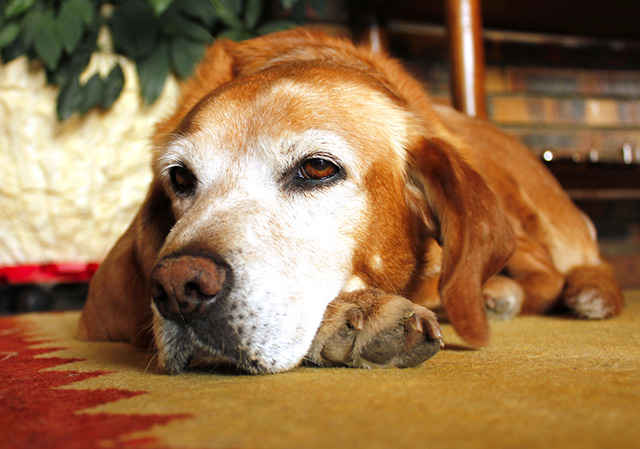Obesity in dogs
Obesity is a big health risk to pets as it is to humans. An older dog is a less active dog, so adjustments to your pet’s diet to reduce caloric intake are imperative. This will relieve pressure on the joints as well as manage the risks of a range of diseases as well as making a massive difference to an overweight dogs quality of life.
A range of diets facilitating weight loss are available which modify ingredients with for example increased fibre, fatty acids and vitamins while decreasing sodium, protein and fat.
Diabetes in dogs
Diabetes is common especially in older dogs. It is a disease in which your dog’s pancreas can no longer produce enough of the hormone insulin. More information can be found by clicking on the Diabetes section link on the right.
Arthritis in dogs
Arthritis’ severity can range from slight stiffness and lameness, difficulty in rising to inability to exercise without pain and ultimately debilitation. Keeping animals as comfortable as possible is vital. Exercise is important to maintain muscle tone and mass, can be adjusted to his/her condition. Anti-inflammatory medication can help relieve the pain. Your veterinary surgeon will prescribe any necessary medication.
Dogs and intolerance to the cold
Intolerance to cold temperatures is more likely as dogs age. There can be a range of explanations including heart and respiratory disease, as well has metabolic and hormone problems to name just a few . Move the dog bed closer to a heat-source and bring them indoors on cold days.
Tooth loss or decay in dogs
Tooth loss or decay not only makes it harder to chew but also increases the likelihood of other potentially serious health problems problems. Care with diet, the use of dental chews as well as brushing and cleaning the teeth will help keep these to a minimum.
Tumours
Prostate enlargement and mammary gland tumours are mostly diagnosed in unneutered dogs. Have the prostate or mammary glands examined at checkups.
Separation anxiety in dogs
Separation Anxiety presents itself when older dogs can’t cope with stress. A range of behaviours including barking and other vocalisatiom, destruction of the home, and loss of toilet control are common signs Appropriate advice on this issue including a range of management techniques designed to accustom the dog to being comfortable left alone. In some cases medication, supplements or pheromone products may be helpful in facilitating behavioural changes.
Dog skin and coat problems
Skin or coat problems in ageing dogs means the skin loses elasticity, making your pet more susceptible to injury while the fur can thin develop scurf or dandruff and become dry, dull or oily over time. This may occur as part of ageing but can also reflect underlying skin, metabolic or hormone problems. Veterinary advice should always be sought should such a change be noted. Regular grooming, appropriate bathing with suitable dog shampoos and essential fatty acid supplements are highly beneficial.
Canine cognitive dysfunction
This manifests itself in confusion, disorientation or decreased activity. Medication may help manage some of these issues.

